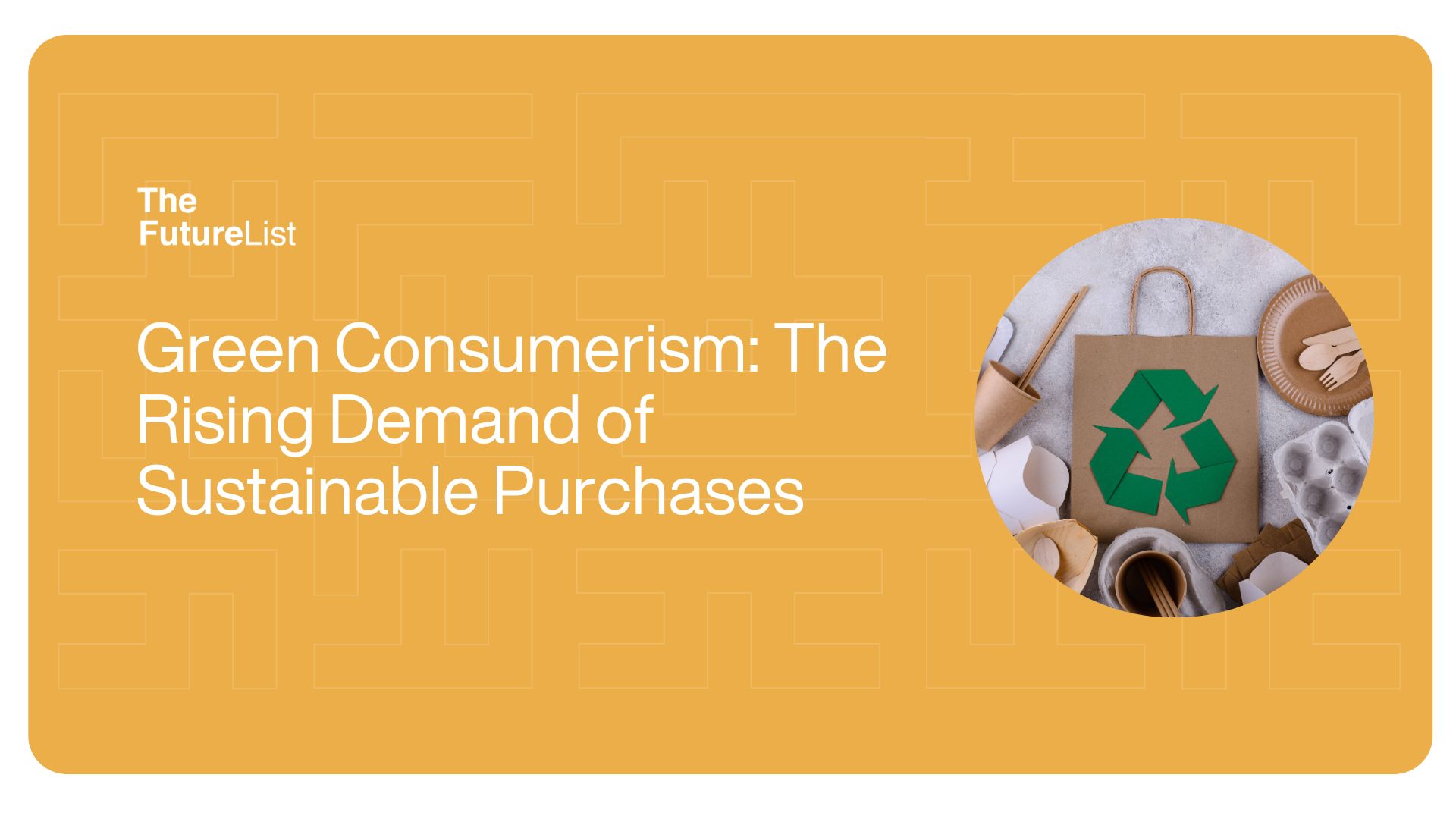
Green Consumerism: The Rising Demand of Sustainable Purchases
“84% of consumers worldwide say sustainability is important when making purchase decisions, and 43% want to spend more money on goods and services from companies that help the community, even if those companies charge a higher price.” Bloomberg
In recent years, the global marketplace has witnessed a significant shift in consumer behaviour towards sustainability. This trend, often referred to as “green consumerism,” reflects a growing awareness and concern for environmental and social issues among consumers worldwide.
Understanding Green Consumerism: Green consumerism is a multifaceted phenomenon driven by consumers’ desire to make ethical and environmentally responsible purchasing decisions. According to Deloitte’s report on sustainable consumer behaviour, consumers are increasingly prioritising sustainability, with a quarter of consumers willing to pay more for sustainability. This shift is not merely a passing trend but rather a fundamental change in consumer values and preferences. Today’s consumers are more informed and conscious of the impact of their consumption patterns on the planet and society. Despite consumer’s desire to purchase sustainable products, many still fail to follow through on their purchases, indicating costs as the hindering factor.
Drivers of Green Consumerism: Several factors contribute to the rise of green consumerism, including heightened environmental awareness, regulatory pressures, and changing demographic trends. McKinsey’s research on sustainability in packaging underscores the influence of global consumers’ evolving attitudes towards sustainability. Consumers are increasingly demanding transparency, accountability, and sustainability from businesses across all industries, including packaging and consumer goods. Moreover, the COVID-19 pandemic has accelerated the shift towards sustainability, with consumers reevaluating their values and priorities in light of the crisis.
Implications for Businesses: For innovators and entrepreneurs, embracing sustainability is not just a moral imperative but also a strategic business decision. Companies that fail to integrate sustainability into their operations risk losing market share and relevance in today’s conscientious consumer landscape. Conversely, businesses that prioritise sustainability can gain a competitive advantage, enhance brand reputation, and drive customer loyalty. By proactively addressing sustainability concerns, businesses can unlock new growth opportunities and strengthen customer relationships.
“When it comes to target markets, the most engaged demographics on sustainability are, perhaps unsurprisingly, higher-income and younger cohorts. In the United States, 67 percent of Gen Z and 68 percent of millennials believe it is important or very important for brands to be conscious of their greenhouse gas emissions (GHG), compared with 58 percent and 57 percent of Gen X and baby boomers.” Mckinsey
Strategies for Capitalising on Green Consumerism: To capitalise on the rising demand for sustainable purchases, innovators and entrepreneurs can adopt several strategic approaches:
Product Innovation: Develop innovative products and solutions that address environmental and social challenges while meeting consumer needs. For example, companies can leverage sustainable materials, design eco-friendly packaging, and incorporate circular economy principles into their product lifecycle.
Transparency and Traceability: Provide transparent information about the sourcing, manufacturing, and supply chain practices of products. Consumers value authenticity and want to make informed choices about the products they buy. By being transparent about sustainability efforts, businesses can build trust and credibility with their target audience.
Marketing and Branding: Communicate sustainability initiatives effectively through marketing campaigns and brand messaging. Highlighting sustainability certifications, environmental commitments, and corporate social responsibility initiatives can resonate with eco-conscious consumers and differentiate brands in the market.
Collaboration and Partnerships: Collaborate with stakeholders across the value chain, including suppliers, NGOs, and industry associations, to amplify sustainability efforts. By working together, businesses can leverage collective expertise and resources to drive meaningful change and address complex sustainability challenges.
Continuous Improvement: Commit to continuous improvement and innovation in sustainability practices. Regularly assess performance metrics, set ambitious sustainability goals, and engage with stakeholders to solicit feedback and identify areas for improvement.
Green consumerism represents a transformative shift in consumer behaviour and market dynamics. For innovators and entrepreneurs, embracing sustainability is not only a moral imperative but also a strategic business imperative. By understanding the drivers of green consumerism and implementing sustainable practices, businesses can unlock new growth opportunities, enhance brand reputation, and drive long-term success. As stewards of the planet and leaders in their respective industries, innovators and entrepreneurs have a unique opportunity to drive positive change and shape a more sustainable future for generations to come.
Get innovation insights from The FutureList weekly. Subscribe to our newsletter here
Categories
- Agritech
- Artificial Intelligence
- Biotech
- Blockchain
- Climate Tech
- Data Infrastructure
- Edtech
- Events
- Fashion
- Fintech
- Healthtech
- Infrastructure
- Innovation Memos
- Innovation Scout Program
- Insight
- Insurtech
- Machine Learning
- Martech
- Mobility
- Music and Media
- Partner Offers
- Perks
- Procurement
- Proptech
- Retailtech
- Ridehailing
- Ridesharing
- Robotics
- Space Aviation
- Supply Chain
- Talent
- Telecoms
- Uncategorized
- Venture Capital
- Wastetech
- Women In Tech
Recent Posts
- How AI Surveillance is Shaping Public Safety in Smart Cities
- Innovation Memo with Zencey: Bringing Equitable Healthcare to Africa
- Inside the Software Model Running Modern Harbours
- The Formula for Future Speed: Data-Driven Performance in Racing
- Leveraging Next-Gen Endoscopic Interventions and Innovations for Healthcare